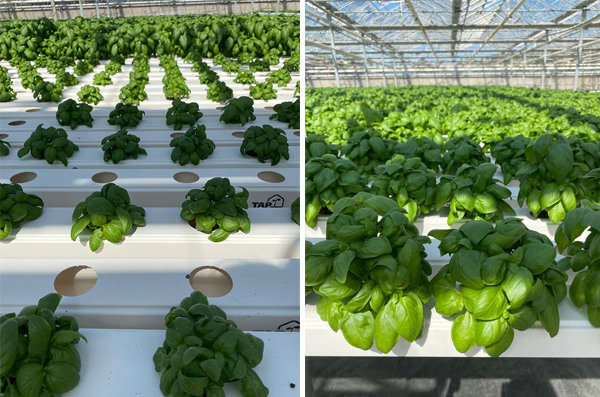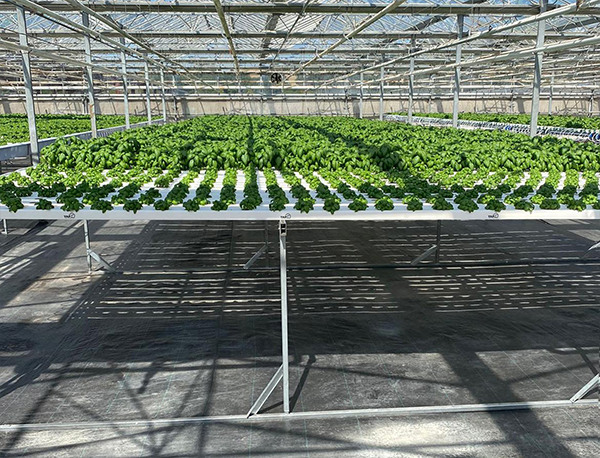“You have to be consistent: whether it’s the vision of the company, or the quality and the taste of your products, you have to be a partner that your customers can rely on,” says Shaoul Abramzcyk. This focus has resulted in a constant growth of the Groupe Mandar, the family company of which he is president. Groupe Les Halles Mandar recently expanded their hydroponic growing acreage by adding a new greenhouse with an NFT system, in which basil is being grown. "

Solutions for aromatic herbs
“When our parents started this company, our business was to deliver fruits and vegetables to the most famous restaurants in Paris,” Shauoul Abramzcyk recalls. “In the beginning of the 80s, one of the chefs asked my parents to find solutions for the aromatic herbs. First we asked some growers to convert to this business, but then we decided to do it ourselves.”
They bought a 14 hectare former geranium greenhouse and switched it over gradually to potted herbs. “The infrastructure was similar and the knowhow wasn’t too far either,” Shaoul says. Ever since, the company has grown their herbs business. In addition, they also grow fruits and vegetables and have a division dedicated to garlic, onions and shallots. With over 450 employees, the Les Halles Mandar Group is a major player supplying retailers, restaurants, and e-commerce players with their fresh produce.

NFT gutters
Over a decade ago, the company was among the first ones to start growing aromatic herbs hydroponically. Nowadays they work mostly in NFT gutters. “I believed in this technique because I saw it worked. The product that we grow is safe, without pesticides or fungicides. It’s a clean product, and we’ve seen that retrieving the water improves your cultivation,” Shaoul says.
Yet, Shaoul adds that there’s more to it. “Our clients want us to grow in the cleanest way, no matter how difficult it is, and they say that the taste of our products is good and that they want to keep using it. Of course, we can use a lot of technical words to explain that our product is of the highest quality, but that our chefs agree that it’s a good product for them is most important.”

Invest and expand
In general, they have faith in the developments in the aromatic herbs market - which is also why the company is investing a lot in growing them hydroponically. Their most recent addition is a Tapkit system. This system was developed to start growing leafy greens anywhere in the world. Normally the Tapkit is a complete 500 m sq hydroponic unit which can produce 6-12 tons of leafy vegetables and fresh herbs per year. Unlike these complete kits, the recent installations are in existing greenhouses, and excluding the tunnel greenhouse - in that way, converting the greenhouse to hydroponics takes only few weeks. Currently, the company is growing basil in there, which “is getting more important as it is being used in sauces and in deserts.”
“We do not only want to grow in quantity, but also focus on the technical side and invest in our knowledge,” Shaoul says. “We believe in this system and in the developers as they speak the same horticultural language as we do. We’re sure this system is helpful to us and see this 500 msq as a trial. If it works, we want to expand with more Tapkits.”

More expensive
“Our strategy might be more expensive than growing in the earth, but it will help us keep our position in the market since it brings us the product that our customers want to buy. To keep that position, we need to invest and find the best solution. And even if we’re sure about the best solution, we need to keep investing in R&D to see what happens.”
“I cannot predict what will be happening in the future, but we are now convinced that our strategy, to be a huge grower of aromatic herbs, is a good decision. We know that we have to be constant in what we deliver. We want to be the partner that our customers can rely on.”
 Teshuva Agricultural Projects
Teshuva Agricultural Projects60 Nof Harim St., Olesh, 42855 Israel
+972-9-8940507
+972-50-7922579
+1-201-5803003
[email protected]
